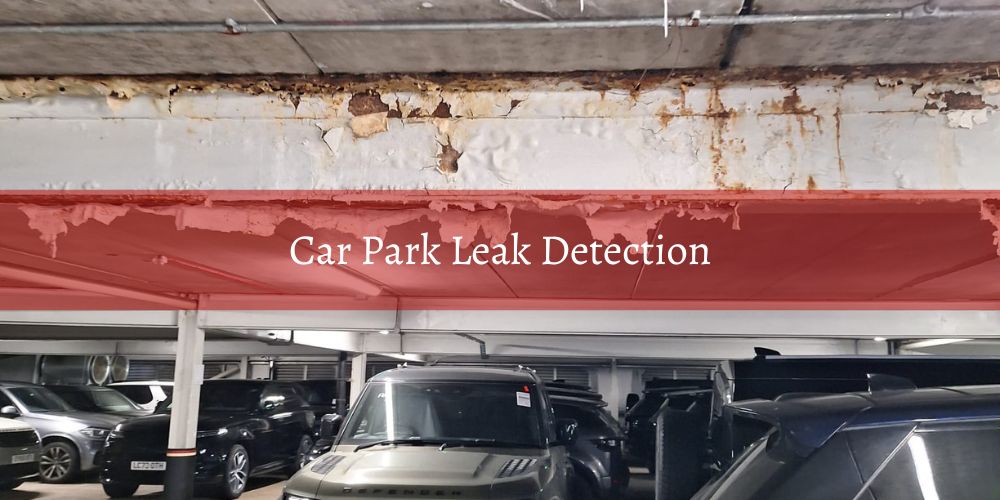Car park leak detection is the process of identifying and locating leaks in the waterproofing systems of parking facilities. The objective of leak detection is to prevent water damage and structural deterioration. The process of car park leak detection can involve various methods, including the use of electronic equipment, infrared thermography, and visual inspections. Effective leak detection helps maintain the structural integrity and safety of car parks by locating and addressing water ingress issues early. Prompt leak detection, followed by the necessary repair work significantly reduce maintenance costs and extends the lifespan of the car park.
Car Park Waterproofing Systems provide specialist car park leak detection services to accurately locate and diagnose sources of water ingress within parking structures. Leaks can compromise structural integrity, damage finishes, and lead to costly repairs if left unresolved. Using advanced diagnostic tools such as electronic leak testing, dye tracing, and moisture mapping, our team identifies both visible and concealed leaks across decks, joints, and detailing points. Once detected, we offer tailored repair and waterproofing solutions to eliminate the problem at its source. Whether part of a wider refurbishment or a targeted investigation, our leak detection services ensure timely intervention and long-term protection for your car park.
What Is Car Park Leak Detection?
Car park leak detection is the process of identifying and locating water ingress within a parking structure. Car park leak detection is vital for maintaining the integrity and safety of the facility. Leaks in car parks can cause significant structural damage, this includes; corrosion of steel reinforcements, concrete deterioration, concrete cracks, and spalling. Methods used for leak detection often include; visual inspections, moisture mapping, and electronic leak detection systems. Visual inspections involve checking for visible signs of water damage. A visual inspection will find water damage issues such as staining and efflorescence. Moisture mapping is another method of car park leak detection.
Moisture mapping uses specialised equipment to measure moisture levels within the structure, this helps to pinpoint the source of leaks. Electronic leak detection systems, include using electric field vector mapping or infrared thermography. Both of these electronic methods of leak detection, can detect and locate leaks with high accuracy. Electric field vector mapping is a used to visualise the direction and magnitude of electric fields within the car park structure. High voltage is used to create a distinct electric field across the waterproof membrane of the car park. If the membrane is intact, the electric field will remain uniform. However, if there are breaches or leaks in the membrane, the high voltage causes a disruption in the electric field,. This disruption can be detected which helps pinpoint the exact location of the leaks in the car park waterproofing. This makes sure repairs can be carried out quickly and efficiently.
Infrared thermography uses infrared cameras to detect and visualise heat patterns on surfaces. In car park leak detection, infrared thermography identifies areas with abnormal temperature variations. These areas with abnormal variations in temperature suggest it is likely the area has moisture intrusion or leaks. When these anomalies are captured using infrared thermography, the process of identifying leaks is greatly accelerated.
In the UK, keeping car park structures in good condition is vital due to rainfall being common. The obvious consequence of extended rainfall is water ingress issues are much more likely. The Chartered Institution of Building Services Engineers (CIBSE) stress the importance of detecting leaks early and carrying out regular maintenance in order to prevent costly repairs and to maximise the longevity of the underlying structure. Fast leak detection not only preserves the structural integrity but also ensures the safety and comfort of car park users by preventing slip hazards and electrical issues caused by water intrusion. Overall, a proactive approach to car park leak detection can significantly enhance the durability and functionality of the facility.
Have a question about an upcoming project?
What Are The Benefits Of Car Park Leak Detection?
Car park leak detection offers a number of benefits, all of which revolve around preserving the functionality and safety of parking facilities. Early identification and remedy of leaks, is imperative to prevent structural damage, minimise long-term repair costs and enhance car park safety. Below we look at the benefits of car park leak detection in more detail.
- Structural Integrity Preservation
- Cost Savings on Repairs
- Enhanced Safety
- Extended Lifespan
- Improved User Experience
- Efficient Maintenance Planning
1. Structural Integrity Preservation
Car park leak detection is essential for preserving the structural integrity of parking facilities. Water ingress can lead to the corrosion of steel reinforcements and the deterioration of concrete, which significantly compromises the strength and stability of the structure. According to the Chartered Institution of Building Services Engineers (CIBSE), early detection and remediation of leaks can prevent up to 80% of structural damage caused by water intrusion. Maintaining the structural integrity ensures that the car park can safely support the weight of vehicles and withstand environmental stressors. This proactive approach reduces the likelihood of major repairs or structural failures, ensuring the car park remains safe and operational for a longer period. Regular inspections and maintenance based on leak detection results help to address issues before they escalate, thereby preserving the overall health of the structure.
2. Cost Savings on Repairs
Effective leak detection can lead to significant cost savings by identifying and addressing leaks before they cause extensive damage. The Building Research Establishment (BRE) reports that proactive maintenance, including leak detection, can reduce repair costs by up to 40%. Early intervention prevents minor issues from escalating into major problems that require expensive repairs. In the UK, where frequent rain can exacerbate water ingress issues, timely leak detection is particularly valuable in minimising maintenance expenses and avoiding costly disruptions. By investing in regular leak detection, facility managers can allocate resources more efficiently, avoiding the higher costs associated with emergency repairs and extensive structural damage.
3. Enhanced Safety
Leak detection enhances safety by preventing hazardous conditions such as slippery surfaces and electrical hazards caused by water intrusion. According to the Health and Safety Executive (HSE), wet surfaces can increase the risk of slips and falls by up to 30%. Detecting and repairing leaks promptly ensures that the car park remains dry and safe for both pedestrians and vehicles. Additionally, preventing water from reaching electrical systems reduces the risk of short circuits and potential fires, further enhancing the overall safety of the facility. Regular leak detection helps to maintain a safe environment, reducing the risk of accidents and ensuring compliance with safety standards.
4. Extended Lifespan
Regular leak detection and maintenance can significantly extend the lifespan of a car park. According to the Journal of Performance of Constructed Facilities, structures with effective leak management systems can have a service life that is 20-30% longer than those without. By preventing water-related damage, leak detection helps maintain the structural integrity and functionality of the car park, allowing it to serve users for many years without the need for extensive renovations or rebuilds. This extended lifespan translates to long-term cost savings and reduced environmental impact due to fewer construction activities. Regular maintenance and early detection of issues ensure that the car park remains in good condition, providing a reliable and safe facility for users.
5. Improved User Experience
A car park that is well-maintained and free of leaks provides a better user experience. Dry, clean, and well-lit environments enhance user satisfaction and encourage repeat usage. The British Parking Association highlights that well-maintained car parks are more likely to retain customers and improve overall user perception. Leak detection ensures that the facility remains in optimal condition, preventing unpleasant conditions such as water puddles, damp smells, and damaged surfaces that can deter users. By maintaining a high standard of cleanliness and safety, car park operators can enhance the overall experience for their customers, leading to increased satisfaction and loyalty.
6. Efficient Maintenance Planning
Implementing a leak detection system allows for more efficient maintenance planning by providing early identification of potential issues. By detecting leaks early, facility managers can schedule necessary repairs during off-peak hours, minimising disruption to car park users. According to the Institute of Facilities Management, proactive maintenance strategies, including regular leak detection, can improve operational efficiency by up to 25%. This efficiency ensures that resources are allocated effectively, allowing for timely interventions that prevent minor issues from escalating into major problems. Additionally, planned maintenance reduces the likelihood of unexpected closures and ensures continuous operation, which is particularly important for facilities with high traffic volumes. Efficient maintenance planning also enables better budgeting and resource management, as facility managers can prioritise repairs and maintenance tasks based on real-time data from leak detection systems.
What Are The Different Methods Of Car Park Leak Detection?
There are a variety of different methods identify leaks accurately and efficiently, each has unique advantages. The different methods of car park leak detection are:
- Infrared Thermography
- Electric Field Vector Mapping
- High Voltage Testing
- Tracer Gas Detection
- Smoke Testing
- Visual Inspection
- Water Testing
How Much Does Car Park Leak Detection Cost?
Car park leak detection costs £350. However, these costs can be higher in some situations including; numerous leaks, buried substrates and large car parks. In most cases, a car park leak detection fee is deductible from any subsequent repair work which is recommended after the leak detection survey
*These estimates are general and actual costs can vary based on specific project requirements, location, and market conditions.
For more details on car park leak detection or to request a quote for your project, click the button below. Our team of leak detection specialists is ready to assist you with all your leak detection needs.


